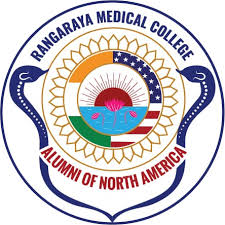General Information
Rangaraya Medical College (RMC), Kakinada
Rangaraya Medical College is one of the oldest and most prestigious public State Government Medical Colleges in Andhra Pradesh. It was established in 1958, initially as a private college by the Kakinada Medical Education Society, through the dedicated efforts of Dr. M. V. Krishnarao and Col. Dr. D. S. Raju. The college was later taken over by the Government of Andhra Pradesh in 1977.
The college is academically affiliated with Dr. YSR University of Health Sciences (YSRUHS), Vijayawada (formerly Dr. NTR University of Health Sciences). This means RMC follows the curriculum and examination schedule set by the state's public health university, which awards the final degrees.
Key Recognitions
Type: State Government Medical College
Affiliation: Dr. YSR University of Health Sciences (YSRUHS), Vijayawada
Recognition: Fully recognized by the National Medical Commission (NMC)
Established: 1958
Campus Facilities
The Campus: A Historic Hub in Kakinada
The college and its associated hospital are centrally located within Kakinada.
Location: The main college campus is located on Pithapuram Road, Kakinada, Andhra Pradesh.
Campus Size & Vibe: The campus is spread over 25 acres (some sources cite 23). It is an urban campus with a rich history, featuring established academic blocks, a large hospital complex, and residential quarters. It's known for its disciplined academic environment and peaceful greenery.
Infrastructure & Facilities:
Academic Blocks: Features spacious, air-conditioned lecture halls (galleries), demonstration rooms, and examination halls.
Laboratories: Well-equipped labs for all pre-clinical and para-clinical departments (Anatomy, Physiology, Biochemistry, Pathology, Microbiology, etc.) as per NMC standards.
Library: A large, air-conditioned central library and a digital library with Wi-Fi, providing students access to a vast range of medical books (19,000+), journals, and e-learning resources.
Residential Life: Separate hostel facilities are provided on campus for boys and girls (UGs, PGs, Interns).
Amenities: The campus includes a large auditorium (1000+ capacity), canteens, mess facilities, and comprehensive sports facilities (cricket ground, football, basketball, volleyball, tennis, badminton, table tennis).
Hospital & Medical Facilities
Leading tertiary care hospital attached to the institution
Healthcare Pillar: Government General Hospital (GGH), Kakinada
The college is attached to a massive, historic government hospital that serves as its primary teaching facility.
Flagship Hospital: The Government General Hospital (GGH), Kakinada is the constituent teaching hospital for the medical college.
Scale & Services: This is a major tertiary care referral hospital for the Godavari districts and surrounding regions, renowned for its immense patient volume.
Capacity: A massive hospital with 915 beds (with capacity reportedly expanded to 1,800+ beds during health emergencies, indicating a very large infrastructure).
Services: Provides comprehensive healthcare services across almost all clinical specialties and numerous super-specialties. It features 24x7 Emergency, Trauma, and advanced Critical Care units (ICU, ICCU, Dialysis Unit), modern Operation Theatres, a licensed Blood Bank, and extensive OPD/IPD services.
Specialized Centers: Includes dedicated blocks for Orthopaedics, Cardiology, a new Maternal and Child Health (MCH) block, and super-specialty departments like Neurosurgery and Paediatric Surgery.
Educational Engine: The GGH is the core clinical training ground for MBBS students and postgraduate residents. The exceptionally high patient inflow provides unparalleled and diverse hands-on clinical exposure, which is considered the college's biggest strength.
Fee Structure
State University Affordability
Fee Structure: Government Subsidized
As a state government medical college, the fees are extremely low and set by the Government of Andhra Pradesh.
Disclaimer: These are indicative figures. Fees are subject to annual revision by the Andhra Pradesh state government. Always verify the precise, current fee structure directly from the official YSRUHS counselling notifications.
City Details
Hostel & Mess
Campus Living: Hostel Facilities
Accommodation: Separate hostel blocks are available for male and female students (UGs, PGs, Interns). Rooms are typically shared (2 to 4 people per room) and provide basic furniture (cot, table, chair).
Amenities: Hostels are functional, with some blocks being older. Maintenance is generally considered average.
Dining: Mess facilities are available and are typically run by student committees. Food quality is generally described as average, with a repeating weekly menu.
Cost: Hostel and mess fees are additional to the tuition fees but are highly economical.
Hostel Fee (Annual): Nominal annual rent (e.g., ~₹13,000).
Mess Charges (Monthly): Paid monthly based on actual expenses, typically ranging from ~₹3,000 to ₹3,500 per month.
Accommodation: Separate hostel blocks are available for male and female students (UGs, PGs, Interns). Rooms are typically shared (2 to 4 people per room) and provide basic furniture (cot, table, chair).
Amenities: Hostels are functional, with some blocks being older. Maintenance is generally considered average.
Dining: Mess facilities are available and are typically run by student committees. Food quality is generally described as average, with a repeating weekly menu.
Cost: Hostel and mess fees are additional to the tuition fees but are highly economical.
Hostel Fee (Annual): Nominal annual rent (e.g., ~₹13,000).
Mess Charges (Monthly): Paid monthly based on actual expenses, typically ranging from ~₹3,000 to ₹3,500 per month.
Miscellaneous
Admissions Process: NEET & State Counselling (AP)
Getting Admitted (MBBS/MD/MS): Admission is strictly and exclusively based on qualifying ranks in NEET-UG (for MBBS) or NEET-PG/SS (for MD/MS/DM/M.Ch).
State Counselling is Key (Andhra Pradesh): Seat allotment is handled entirely through the Andhra Pradesh State Centralized Counselling Process conducted by Dr. YSR University of Health Sciences (YSRUHS).
15% All India Quota (AIQ): Seats are filled through the MCC (Medical Counselling Committee) counselling, open to students from all over India.
85% State Quota: Seats are reserved for students with Andhra Pradesh domicile and are filled through the YSRUHS (AP-NEET) state counselling.
Always check the official YSRUHS (uhsap.in) and MCC (mcc.nic.in) websites for counselling schedules and procedures.
Getting Admitted (MBBS/MD/MS): Admission is strictly and exclusively based on qualifying ranks in NEET-UG (for MBBS) or NEET-PG/SS (for MD/MS/DM/M.Ch).
State Counselling is Key (Andhra Pradesh): Seat allotment is handled entirely through the Andhra Pradesh State Centralized Counselling Process conducted by Dr. YSR University of Health Sciences (YSRUHS).
15% All India Quota (AIQ): Seats are filled through the MCC (Medical Counselling Committee) counselling, open to students from all over India.
85% State Quota: Seats are reserved for students with Andhra Pradesh domicile and are filled through the YSRUHS (AP-NEET) state counselling.
Always check the official YSRUHS (uhsap.in) and MCC (mcc.nic.in) websites for counselling schedules and procedures.
Career Pathways & Placements
Career Path: As one of India's premier government medical colleges, the career path for graduates is excellent.
Internship: MBBS graduates complete a mandatory 1-year rotatory internship at the Government General Hospital, Kakinada, for which they receive a stipend as per state government norms (approx. ₹22,000 - ₹25,000 per month).
Post-Graduation: The extensive clinical exposure at GGH makes graduates highly competitive for PG seats (via NEET-PG) or immediately employable as Medical Officers. The institute offers over 200 of its own PG seats, providing a strong in-house pathway.
Career Path: As one of India's premier government medical colleges, the career path for graduates is excellent.
Internship: MBBS graduates complete a mandatory 1-year rotatory internship at the Government General Hospital, Kakinada, for which they receive a stipend as per state government norms (approx. ₹22,000 - ₹25,000 per month).
Post-Graduation: The extensive clinical exposure at GGH makes graduates highly competitive for PG seats (via NEET-PG) or immediately employable as Medical Officers. The institute offers over 200 of its own PG seats, providing a strong in-house pathway.
Information for NRI / Foreign Nationals
Collage Images Gallery
Facilities & Campus Life
Well-equipped Library
Experienced Faculty
Computer Lab
Sports Activities
Heritage Campus
Frequently Asked Questions
Why Consult With Us?
- 15+ years of experience in medical education counseling
- 5000+ students successfully guided
- 50+ partner universities worldwide
- Free initial consultation with no obligation














